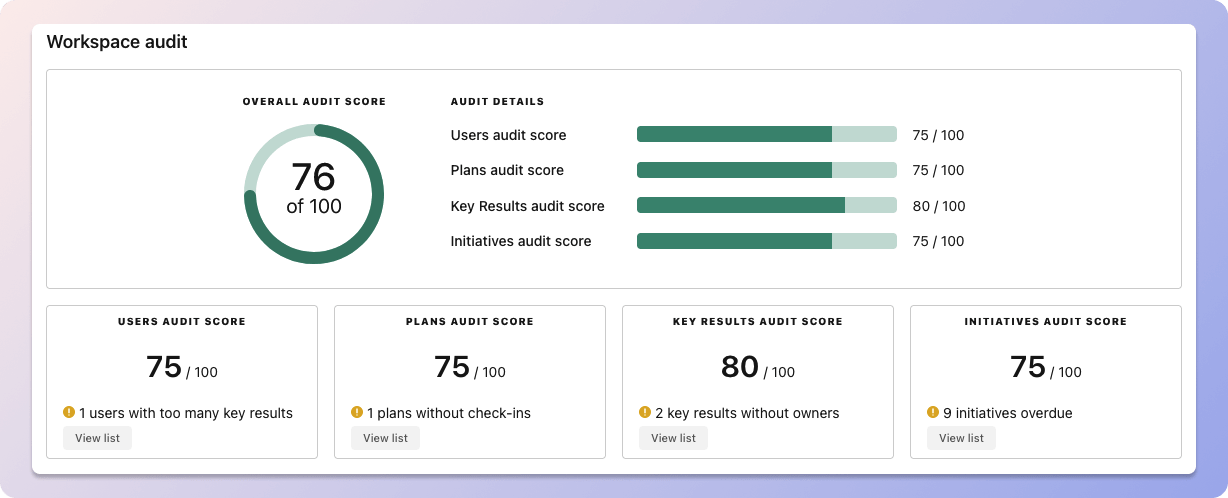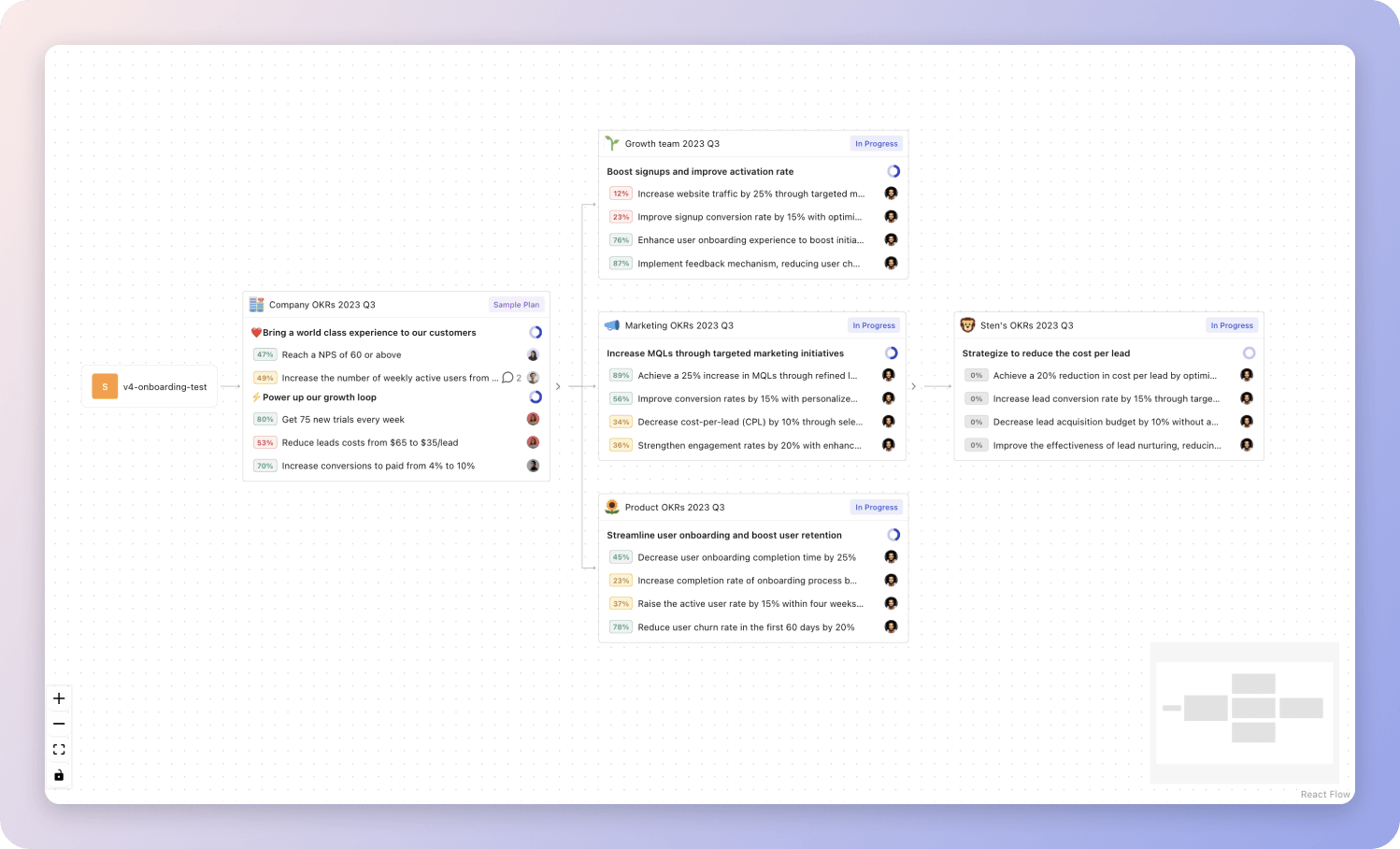5 OKR examples for Writing
What are Writing OKRs?
The OKR acronym stands for Objectives and Key Results. It's a goal-setting framework that was introduced at Intel by Andy Grove in the 70s, and it became popular after John Doerr introduced it to Google in the 90s. OKRs helps teams has a shared language to set ambitious goals and track progress towards them.
Formulating strong OKRs can be a complex endeavor, particularly for first-timers. Prioritizing outcomes over projects is crucial when developing your plans.
We've tailored a list of OKRs examples for Writing to help you. You can look at any of the templates below to get some inspiration for your own goals.
If you want to learn more about the framework, you can read more about the OKR meaning online.
Best practices for managing your Writing OKRs
Generally speaking, your objectives should be ambitious yet achievable, and your key results should be measurable and time-bound (using the SMART framework can be helpful). It is also recommended to list strategic initiatives under your key results, as it'll help you avoid the common mistake of listing projects in your KRs.
Here are a couple of best practices extracted from our OKR implementation guide 👇
Tip #1: Limit the number of key results
Focus can only be achieve by limiting the number of competing priorities. It is crucial that you take the time to identify where you need to move the needle, and avoid adding business-as-usual activities to your OKRs.
We recommend having 3-4 objectives, and 3-4 key results per objective. A platform like Tability can run audits on your data to help you identify the plans that have too many goals.
 Tability's audit dashboard will highlight opportunities to improve OKRs
Tability's audit dashboard will highlight opportunities to improve OKRsTip #2: Commit to the weekly check-ins
Having good goals is only half the effort. You'll get significant more value from your OKRs if you commit to a weekly check-in process.
Being able to see trends for your key results will also keep yourself honest.
 Tability's check-ins will save you hours and increase transparency
Tability's check-ins will save you hours and increase transparencyTip #3: No more than 2 yellow statuses in a row
Yes, this is another tip for goal-tracking instead of goal-setting (but you'll get plenty of OKR examples below). But, once you have your goals defined, it will be your ability to keep the right sense of urgency that will make the difference.
As a rule of thumb, it's best to avoid having more than 2 yellow/at risk statuses in a row.
Make a call on the 3rd update. You should be either back on track, or off track. This sounds harsh but it's the best way to signal risks early enough to fix things.
Building your own Writing OKRs with AI
While we have some examples below, it's likely that you'll have specific scenarios that aren't covered here. There are 2 options available to you.
- Use our free OKRs generator
- Use Tability, a complete platform to set and track OKRs and initiatives
- including a GPT-4 powered goal generator
Best way to track your Writing OKRs
Your quarterly OKRs should be tracked weekly in order to get all the benefits of the OKRs framework. Reviewing progress periodically has several advantages:
- It brings the goals back to the top of the mind
- It will highlight poorly set OKRs
- It will surface execution risks
- It improves transparency and accountability
Most teams should start with a spreadsheet if they're using OKRs for the first time. Then, once you get comfortable you can graduate to a proper OKRs-tracking tool.
 Tability's Strategy Map makes it easy to see all your org's OKRs
Tability's Strategy Map makes it easy to see all your org's OKRsIf you're not yet set on a tool, you can check out the 5 best OKR tracking templates guide to find the best way to monitor progress during the quarter.
Writing OKRs templates
We've covered most of the things that you need to know about setting good OKRs and tracking them effectively. It's now time to give you a series of templates that you can use for inspiration!
You'll find below a list of Objectives and Key Results templates for Writing. We also included strategic projects for each template to make it easier to understand the difference between key results and projects.
Hope you'll find this helpful!
OKRs to improve your writing skills
Improve my writing skills
Increase the average time spent writing from 1h to 4h/week
Increase the number of words published per week from 250 to 1,500 words
Increase the accuracy of spelling and grammar in written work by 20%
Implement a system for feedback and follow-up on errors.
Utilize a spell-check tool for all documents.
Establish an internal style guide for written work.
Have a colleague or supervisor review all written work.
Increase the average rating of written pieces by 1 star
Create action plans to improve the quality of written pieces.
Identify areas of improvement based on survey feedback.
Monitor progress and adjust plans as needed.
Conduct a survey to understand why pieces are rated lower than expected.
OKRs to improve writing skills
Improve blog post writing skills
Increase the average time spent on each blog post by 20%
Receive at least 10 positive comments on blog posts
Create and publish 3 blog posts with a minimum of 500 words each
OKRs to enhance skill at describing campus locations
Enhance skill at describing campus locations
Get feedback on descriptions from 3 different peers for improvement
Analyze received feedback for possible improvements
Send descriptions to selected peers for feedback
Identify 3 peers to review your descriptions
Achieve a 90% satisfactory rating on descriptive composition focused on campus locations
Regularly practice writing descriptive compositions
Thoroughly study descriptions of various campus locations
Request and incorporate feedback from peers
Practice detailed description of 5 different campus places every week
Choose 5 unique campus locations to explore each week
Review and revise your descriptions regularly for improvement
Write a detailed description for each chosen location
OKRs to achieve production readiness for MassBalancer ISCC EU feature
Achieve production readiness for MassBalancer ISCC EU feature
Ensure 100% documentation of the MassBalancer ISCC EU feature for user reference
Identify gaps in the current documentation
Review existing documentation on the MassBalancer ISCC EU feature
Update or create necessary documents to fill in gaps
Complete all necessary development tasks associated with the MassBalancer ISCC EU feature
Finalize the code for the MassBalancer ISCC EU feature
Test the feature for efficiency and bug fixes
Release and integrate the feature into the main software platform
Successfully conduct beta testing for MassBalancer ISCC EU with zero critical issues
Set up and distribute MassBalancer ISCC EU to selected beta testers
Identify and resolve any critical issues immediately
Regularly monitor and collect feedback from beta testers
OKRs to successfully execute "Test Objective"
Successfully execute "Test Objective"
Deliver final report documenting the results and lessons learned
Document lessons learned and improvement strategies
Finalize and proofread the final report
Highlight primary results and key findings
Complete initial research and preparation by Week 2
Dedicate Day 8 to thorough examination of available resources
Finalize and document findings and preparations by Day 14
Define research objectives and desired outcomes by Day 6
Achieve 25% progress towards "Test Objective" every week
Assess weekly targets and track progress consistently
Actively utilize learning resources to understand concepts better
Allocate dedicated time daily for focused test preparation
More Writing OKR templates
We have more templates to help you draft your team goals and OKRs.
OKRs to drive 110% growth in MRR for our new product
OKRs to increase mastery in applying the agile process
OKRs to optimize financial operations for strategic partnerships and alliances
OKRs to increase Domain authority score to 35
OKRs to achieve consistent delivery of a high-quality application
OKRs to boost website conversion rate to 1%
OKRs resources
Here are a list of resources to help you adopt the Objectives and Key Results framework.
- To learn: Complete 2024 OKR cheat sheet
- Blog posts: ODT Blog
- Success metrics: KPIs examples